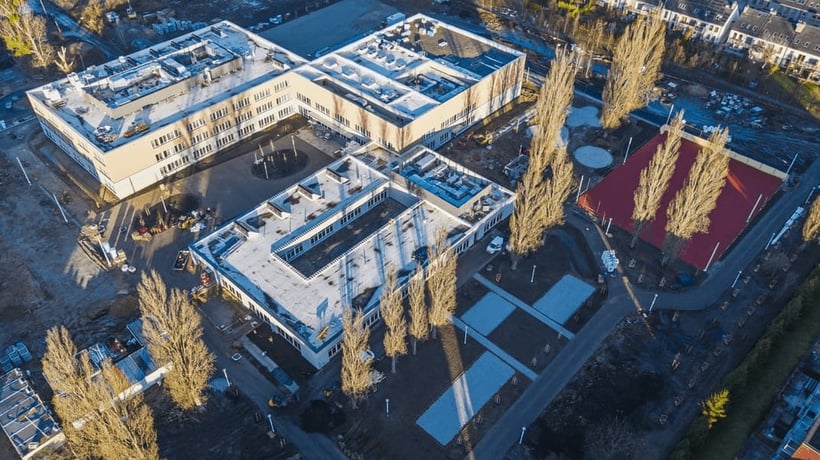
At the Wroclaw airport there is the bioethical environment management section, which takes care of the ecosystem of the airport and its environment. Being almost empty because of its intended use, this largest meadow in Wroclaw is an ideal place not only for numerous species of birds, but also for foxes or raccoon dogs. However, their presence may make the operational functioning of the airport difficult.
Even small birds are dangerous
"Take-off and landing operations are the most demanding moments of a flight for a pilot. If even a small bird fell into the engine at that time, the results might be disastrous," says Henryk Tokarek. In fact, we do not realise that the glass pane of a light aircraft may be pierced even by a small swift with a weight of 40 grams, and when a rook with a weight of 200 grams bumps into a plane flying at a speed of 300 km/h, it hits against the fuselage with a force of 3 tons. Such a tragic accident happened in Boston in 1970, when a four-engine plane flew into a murmuration of starlings. Three engines exploded and the machine fell down into the Boston Bay from a height of 70 m. 62 passengers died. However, not only birds can be dangerous for a plane. Difficult situations may happen already at the runway. When a plane hits a fox or a raccoon dog, this involves not only the death of the animal – long-lasting procedures must be started to stop the flight. A whole staff of people and animals is employed to avoid such situations.
Winged police
The busiest period for the airport is beginning at the moment. This is the time when birds begin to migrate from the south to the north, and meadows are an ideal place for them to rest and regenerate their strength. There is no better address than the Wroclaw airport for that purpose. However, birds are uninvited and unwelcome guests there during take-offs and landings. And here begins the work of the falconer and airport security guards, who supplement one another. The falconer of the Wroclaw airport is supported by a team consisting of four lanners, two chicken hawks and one Harris’ hawk. They have been reared by Mr Tokarek since their brood days, but they are not domestic birds. They treat their caretaker and mentor as a member of their flock, or even as their guide. At the time of their work, however, they turn into real machines with a clear mission. They scare away other creatures and make use of their beaks and claws when necessary. The falconer works at intervals between air operations, i.e., take-offs and landings of planes. These are the guidelines aimed at guaranteeing the safety of passengers so that birds employed at the airport do not pose an additional threat.

Animals have to be surprised
"The bird-human patrol is a method addressed to strictly specified species of "intruders" entering the airport, which is aimed at preparing the manoeuvring area for further planes. A winged predator scares each flock away immediately. Birds have an inborn fear of predators. We also have scaring devices that automatically emit sounds of predators, but we rarely use them, because their effectiveness is low. Birds quickly become accustomed to them and stop reacting," says Anna Solarska from the team co-ordinating the management of animated nature at the airport. A falconer has to be familiar with the customs of many different birds, such as lapwings, geese, swallows, sparrows or storks, and to know when they migrate or when they are more active. Other methods used for scaring away birds and other animals (foxes, raccoon dogs) include exploding, whistling and luminous fireworks and an electronic scaring device.
Special monitoring system
In addition, the Wroclaw airport uses an electronic system for reporting the activity of birds and other animals. It has been designed and strictly adapted to the needs and the specific characteristics of the Wroclaw airport. How does it work in practice? When an employee observing the activity of animals at the airport notices a bird or any other animal in an area where it may pose a threat to air operations, he records this fact on the tablet, choosing the kind of animal in the system, marking its location on the map and reporting the method chosen to scare the animal away and the effectiveness of the operation. This system allows the staff to keep track of the activity of animals, their customs and reactions to activities undertaken by the airport. "Apart from that, we meet from time to time in order to consider and find out why certain species appear in a certain area at a given moment and what attracts them," adds Anna Solarska.
The grass matters, too
Vegetation plays an important part in the ecosystem of the airport. The Wroclaw airport co-operates with the Wroclaw University of Environmental and Life Sciences and the Institute of Plant and Seed Protection. They work together in order to obtain top-quality grasses that do not grow too thickly, absorb water and do not contain an excessive number of insects that attract birds.

Mission for a dog
Two years ago, the Wroclaw airport "employed" yet another animal – a hound dog called Oskar. Its task is not to look for drugs or explosives in luggage, but to find and scare away birds. Thanks to its excellent sense of smell, it accurately detects foxes’ lairs. Oskar is the favourite pet of the team. The friendly red-headed dog likes the company of people, loves to be caressed and treats its job as a pleasure. "In a sense, we all are like Oskar. For us, this occupation is not an everyday duty, but a passion. I have always loved birds – I was born to do so. Sometimes I regret that these wild birds run away at my sight here at the airport, but I console myself with the fact that this is for their safety, too," concludes Henryk Tokarek.
Photographs by Janusz Krzeszowski
![Winged police of the Wroclaw airport [PHOTOS]](https://www.wroclaw.pl/cdn-cgi/image/w=1200,h=600,fit=crop,f=avif/en/files/news/15856/sokolnik-6.jpg)





